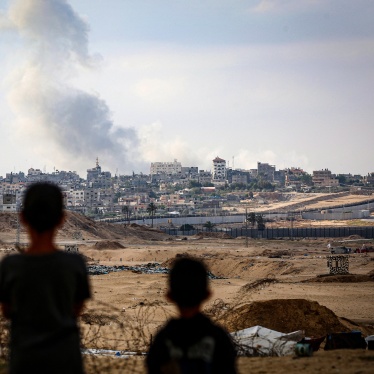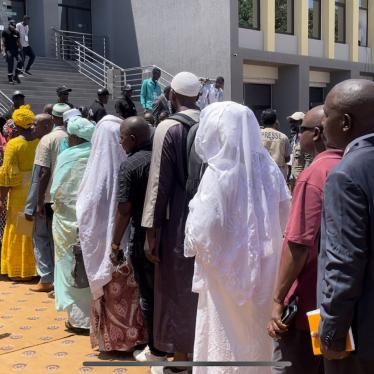(New York) - During his first few weeks as UN secretary-general, Ban Ki-moon seems to have had a hard time treading the line between his diplomat's desire to be Mr. Nice, and the requirements of a job in which speaking truth to power is essential.
Ban's reluctance to condemn the death penalty outright was dismaying, especially in the context of Saddam Hussein's execution—though he subsequently discovered stronger language. On other issues, he has made the right noises, but he must move from sound bites to action.
This week, Ban embarked on his first foreign trip as secretary-general—arriving first in Brussels and Paris before heading on to Kinshasa and then Addis Ababa for the African Union summit meeting next week. This trip will give him the opportunity to show he intends to be a real leader on human rights — even at the risk of causing offense.
With the continued killing in Darfur, real pressure is needed on Khartoum — including from the secretary-general himself. Even now, despite Sudan's resumption of indiscriminate bombing, and the spillover of violence into eastern Chad, there has been too little pressure for Khartoum to end its abusive polices. Instead, shamelessly, Sudan is even seeking to be elected as chair of the African Union at the meeting next week.
Some of the necessary diplomatic skills will come easily to Ban, who was South Korea's foreign minister before taking on the UN post. But gentle words only go so far. Outspokenness is needed, too—above all from the secretary-general, with his international authority. Sudan continues to resist efforts to strengthen the African Union force in Darfur with UN troops. That must change. For huge numbers of civilians across the region, caution has already proved deadly.
In Congo, too, Ban must not mince his words about the scale of the problems still facing the country, though many will be eager for him to do so. After a series of wars resulted in millions of civilian deaths, elections last year brought some hope for stability. But the situation remains deeply unstable. Any weakening of the UN peacekeeping force, in size or mandate, could risk Congo slipping back into chaos.
On his return to New York, Ban must emphasize that human rights cannot be sidelined. So far, his much-repeated mantra has been on the importance of UN reform. Few would disagree that management and structural reform is needed. But what price better management if Ban does not provide a voice for the unheard victims of abuse around the world? Ban talks of the need for "harmony." So far, so genteel. But there is also the danger of a false harmony, achieved by placating powerful and abusive governments.
In some areas at least, Ban has sent positive signals, including an emphasis on women's rights. A United Nations panel recently acknowledged that the UN's own contribution to achieving gender equality has seemed "incoherent, under-resourced and fragmented."
That can change. But Ban's own commitment will be needed to make the panel's recommendations happen—including a more streamlined approach and the creation of a unified body responsible for gender equality which could at last be more effective in working, for example, towards the goal of achieving girls' full access to schooling.
Above all, Ban must help move things from fine words to tangible reality. World leaders agreed in 2005 on their shared responsibility to protect civilians from serious war crimes and genocide. So far, that policy remains mere rhetoric, as the continuing nightmare in Darfur vividly reminds us. With sufficient determination, Ban could move the policy towards reality for the first time.
He can also help reinvigorate the new Human Rights Council, which during the past year has been entangled in politicking of the most self-defeating kind.
Human rights are not a fringe issue, to be dealt with only once the "grown-up" issues of peace and security are out of the way. On the contrary, the protection of human rights promotes peace and security. In theory, Ban accepts the linkage, which his predecessor frequently emphasized. But in practice that means that boldness will sometimes have to trump caution. If Ban wants to be favorably remembered by history, he will do well to bear that simple truth in mind.






